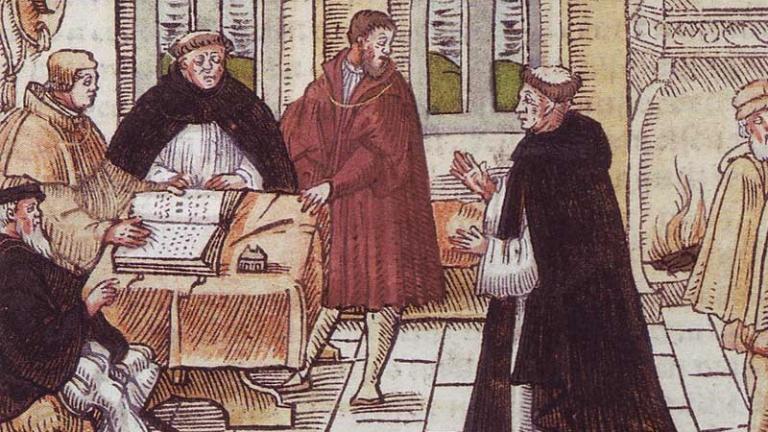
Luther and Cajetan (public domain image)
Things the pope says in an interview with the press are not Magisterial. I suppose I must clarify that before someone inevitably comes along to accuse me of contradicting my own words. I apologize, though, for being a bit late on this; the interview in question was in June. I checked my archives; God knows what I was doing at the time that made me miss this.
At any rate, in the interview the pope was asked about rehabilitating Martin Luther, or lifting his excommunication.
(Honestly, Luther’s been dead since 1546. What would lifting an excommunication even mean? Excommunications don’t continue beyond the grave. Where do they get these reporters?)
Here is part of what the pope said:
And today Lutherans and Catholics, Protestants, all of us agree on the doctrine of justification. On this point, which is very important, he did not err.
No, no, no. Now see, this infuriates me as an apologist (and former Protestant). It is one thing to have to correct this nonsense when it comes from the late Anglican bishop Tony Palmer. But from the pope? I defend the poor man, but at times he exasperates me.
I pointed this out in 2014, and I point it out again now: The CDF has said that Catholics and Lutherans (still less Catholics and “Protestants” in the aggregate) do not in fact “agree” on justification. Here is what the CDF says:
The Catholic Church is, however, of the opinion that we cannot yet speak of a consensus such as would eliminate every difference between Catholics and Lutherans in the understanding of justification.
And the document goes on to list some of the disagreements that still exist.
- Lutherans believe that, even after baptism, sin still remains. Catholics teach that baptism takes away “everything that is really sin.”
- Catholics believe that the “regula fidei” is the confession of God in three persons; Lutherans believe it is their understanding of justification
- The Church teaches teach that we are able to cooperate with grace, whereas Lutherans insist on the “bondage of the will”
- The Church teaches that good works are the fruit of both grace and the individual whom grace has transformed. Lutherans teach that good works are the fruit of grace alone.
Now, it is true, that some consensus has been reached between Catholics and Lutherans on justification. But it is not at all true to say, as Pope Francis does, that we all “agree” now, as though there are no differences to speak of. And for him to say that Luther “did not err” on justification is just flat baloney.
I mean, for heaven’s sake, Luther taught justification by faith alone. The Council of Trent condemned this error. Was Trent wrong? Or was Pope Leo X wrong in Exsurge Domine?
- Leo X condemned Martin Luther’s view that the sacraments give pardoning grace
- Leo X condemned Martin Luther’s teaching that sin remains after baptism
- Leo X condemned Martin Luther’s view that a just man sins in doing a good work
And in its Canons on Justification, the Council of Trent pronounced an anathema on the following views of Luther:
- Canon 5 anathematized the view that Adam’s sin destroyed free will
- Canon 7 anathematized the view that good works before justification are sinful
- Canon 9 anathematized justification by faith alone
- Canon 11 anathematized imputed righteousness
- Canon 25 anathematized the view that good works are venial sins even for the just man
There are important differences between Protestants and Catholics, and ecumenism is of no use if we don’t treat them honestly. We can’t just pretend they are not there and wish them away. If Luther “did not err,” did the Church err? Should we all become Protestants?
Trent was right; Leo X was right. Luther did indeed err; and in this particular statement, so did Pope Francis. I love Pope Francis; he’s my Father; but no, no, no. He was wrong.












